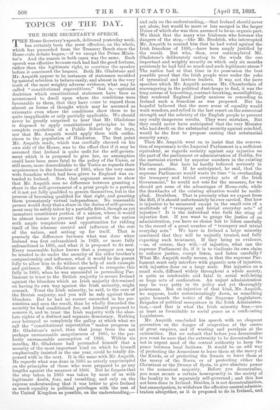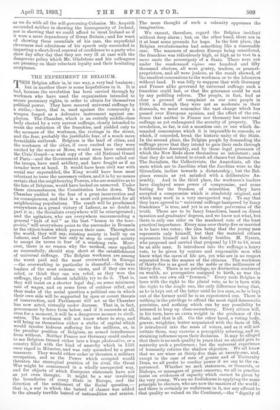TOPICS OF THE DAY.
THE HOME SECRETARY'S SPEECH. THE Home Secretary's speech, delivered yesterday week, has certainly been the most effective, on the whole, which has proceeded from the Treasury Bench since the Home-rule debate began,—if we except the Prime Minis- ter's. And the reason in both cases was the same. Each speech was effective because each had had the good fortune, rather than the legitimate right, to convince the speaker before it convinced the hearers. Both Mr. Gladstone and Mr. Asquith appear to be instances of statesmen moulded by natural selection to believe easily, and almost in the very teeth of the most weighty adverse evidence, what may be called "constitutional superstitions," that is,—optimist doctrines which constitutional statesmen have been so accustomed to dwell upon where the conditions were favourable to them, that they have come to regard them almost as forms of thought which may be assumed as axiomatic even where the conditions show them to be quite inapplicable or only partially applicable. We should never be greatly surprised to hear that Mr. Gladstone is disposed to apply constitutional principles to the complete regulation of a Public School by the boys, nor that Mr. Asquith would apply them with enthu- siasm to the population of Hindostan. The first point Mr. Asquith made, which was cordially cheered on his own side of the House, was to the effect that if it may be assumed that Ireland is quite unfit for the self-govern- ment which it is proposed to give her, no assumption could have been more fatal to the policy of the Union, or still more, more discreditable to the Tories as regards their acquiescence in the franchise of 1885, when the very same wide franchise which had been given to England was ex- tended to Ireland. Now, that argument seems to show that Mr. Asquith sees no difference between granting a share in the self-government of a great people to a portion of it not yet fully qualified to govern themselves, but in the process of becoming qualified for that right, and granting them prematurely virtual independence. No reasonable person would deny that a share in the duties of self-govern- ment may be safely taken by a partially fitted, though as yet immature constituent portion of a nation, where it would be almost insane to present that portion of the nation with ample temptations and opportunities for ridding itself of the irksome control and influence of the rest of the nation, and setting up for itself. That is precisely the difference between what was done when Ireland was first enfranchised in 1829, or more fully enfranchised in 1885, and what it is proposed to do now. Every reasonable father knows that a younger son may be trusted to do under the security of his elder brother's companionship and influence, what it would be the purest folly to allow him to do without the help of such example and guidance. Mr. Gladstone appeared to recognise this fully in 1885, when he was successful in persuading Par- liament to trust to the British majority to secure Ireland against the blunders which an Irish majority determined on having its own way against the Irish minority, might commit. Trust the Irish minority, he said, to the care of the British majority, and you will be safe against those blunders. But he had no sooner succeeded in his per- suasions and seen the result, than be wholly discarded the security he had conditioned for, and himself proposed to remove it, and to trust the Irish majority with the abso- lute rights of a distinct and separate democracy. Nothing ever betrayed so completely the gallop at which -what we call the "constitutional superstition" makes progress in Mr. Gladstone's mind, than that jump from the not perhaps unreasonable sanguineness of 1885, to the per- fectly unreasonable assumption of 1886. Within six months, Mr. Gladstone had persuaded himself that a security of the most important kind on which he hitnself emphatically insisted in the one year, could be totally dis- pensed with in the next. It is the same with Mr. Asquith. He regards what was done in 1885 as utterly unprincipled on the principles of those who were prepared to go any lengths against the measure of 1886. But he forgets that the step taken in 1885 was taken by most of us with legitimate doubt, fear, and trembling, and only on the express understanding that it was better to give Ireland as much equality in political privileges with the rest of the United Kingdom as possible, on the understanding,— and only on the understanding,—that Ireland should never act alone, but would be more or less merged in the larger Union of which she was then assumed to be an organic part. We think that the many wise Irishmen who foresaw the dangers of the step,—like Mr. Brodrick, who interrupted Mr. Asquith to remind him that he had voted against the Irish franchise of 1885,—have been amply justified by the result. But who, then, ever contemplated Mr. Gladstone's deliberately casting to the winds the one important and weighty security on which only six months previously he had laid so much and such legitimate stress ? The nation had at that time in its possession the best possible proof that the Irish people were under the yoke of tyrannical and lawless leaders. It was not the mere speeches which Mr. Asquith accuses Mr. Chamberlain of scavengering in the political dust-heaps to find, it was the long course of boycotting, contract-breaking, moonlighting, that rendered England justly anxious in conceding to Ireland such a franchise as was proposed. But the hopeful believed that the mere sense of equality would work wonders, and relied in the last resort on the numerical strength and the sobriety of the English people to prevent any really dangerous results. They were mistaken. But they could never have anticipated that the very Minister who had dwelt on the substantial security against mischief, would be the first to propose casting that substantial security away. Then Mr. Asquith went on to insist that the reserva- tion of supremacy to the Imperial Parliament is a sufficient equivalent, as regards security against any injustice on the part of the parliament or administration of Dublin, for the restraint exerted by superior numbers in the existing Parliament. But here he hardly believed seriously in his own position. If he anticipated, he said, that the supreme Parliament would waste its time "in overhauling the trumpery and trivial everyday acts of the Irish Government," he would not vote for the measure, for we should get none of the advantages of Home-rule, while the drawbacks of the existing situation would be multi- plied. Doubtless. That is precisely what we expect from the Bill, if it should unfortunately be ever carried. But how is injustice to be measured except in the small coin of a multitude of " trumpery and trivial everyday acts" of injustice It is the individual who feels the sting of injustice first. If you want to gauge the justice of an administration, you have no choice but to listen carefully to the record of a great number of "trumpery and trivial everyday acts." We have in Ireland a large minority convinced that they will be unjustly treated, and fully expecting such treatment. If they bring us evidence, —as, of course, they will,—of injustice, what can the supreme Parliament do, if it is to vindicate its own claim, to enforce justice, except listen, and listen carefully ? What Mr. Asquith really means, is that the supreme Par- liament must only interfere with gigantic acts of injustice,. with injustice done on a large scale. But injustice on a. small scale, diffused widely throughout a whole society, is quite as intolerable and fatal to social well-being as huge acts of confiscation. An unjust administration may be very petty in its policy and yet thoroughly poisonous. But on injustice of that kind, Mr. Asquith, we suppose, looks comnaiseratingly down, as something quite beneath the notice of the Supreme Legislature. Brigades of political mosquitoes in the Irish Administra- tion,—and that is what the Irish minority fear,—are at least as formidable to social peace as a confiscating Legislature.
Mr. Asquith concluded his speech with an eloquent peroration on the danger of congestion at the centre of great empires, and, of wasting and paralysis at the extremities. But we submit that before you decentralise you must be sure that the extremity to be decentralised is not in urgent need of the central authority to keep the peace between local factions. It would be an odd way of protecting the Armenians to leave them at the mercy of the Kurds, or of protecting the Swazis to leave them at the mercy of the Boers, or of protecting either the Christians or the Druses of Syria, to give absolute power to the numerical majority. Before you decentralise,. you must secure a certain homogeneity in the society of the locality to be separately self-governed ; and this has not been done in Ireland. Besides, it is not decentralisation, but emancipation, to withdraw the effective central adminis- tration altogether, as it is proposed to do in Ireland, and as we do with all the self-governing Colonies. Mr. Asquith succeeded neither in showing the homogeneity of Ireland, nor in showing that we could afford to treat Ireland as if it were a mere dependency of Great Britain ; and for want of showing these essentials of his case, the superficial cleverness and adroitness of his speech only succeeded in imparting a short-lived renewal of confidence to a party who show day after day that they are very ill at ease with the dangerous policy which Mr. Gladstone and his colleagues are pressing on their reluctant loyalty and their hesitating acceptance.







































 Previous page
Previous page